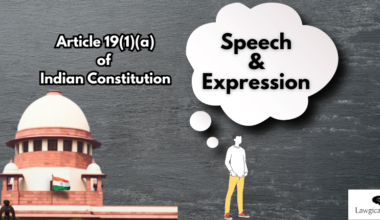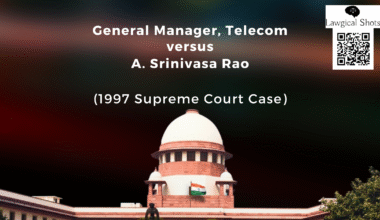Who knew that once a business feud could lead to murder and money theft? That’s the case in SD Shabuddin v. State of Telangana (2025). The case rest on circumstantial evidence, and thus, the two accused were acquitted in murder and theft allegations, but convicted for dishonestly receiving stolen property. However, the major question that arose before the Court was whether receiving stolen property was punishable when the Court had acquitted them for theft? Let’s explore the Supreme Court’s findings.
Factual Background
A person went to Warangal to collect Rs. 2,92,629 and never returned. The Prosecution story reflects that the deceased worked for someone and then started his own business, which caused heavy losses to previous employer. The Police suspected his business competitor and another who killed the deceased and deposited Rs 2.4 lakhs in bank, while keeping the rest of money.
The Trial Court acquitted the two of murder and theft, essentially rejecting the Prosecution’s murder theory. and the Trial Court convicted both men for “receiving stolen property” simply because they possessed money they couldn’t fully explain. The High Court reduced the sentence of 3 year imprisonment to 1 year. It may be noted that the main accused died during pendency of appeal before the High Court.
This created a fundamental logical problem: If the courts didn’t believe any theft occurred (as shown by their acquittals), how could they then convict someone for receiving stolen money from that same non-existent theft?
Issues Before the Court
The Supreme Court had to resolve two key questions:
First Issue: Did the High Court’s decision reverse the burden of proof upon the appellants? Is that legally sustainable?
Second Issue: Can someone be convicted for receiving stolen property when the same court has found that no theft occurred?
Supreme Court’s Observations on Receiving Stolen Property
Issue 1 – Reverse Burden of Proof
The Court found that the High Court had committed a serious legal error by placing the burden on the accused to prove their innocence regarding possession of cash. The courts had based their conviction on the reasoning that the accused were “unable to account for being in possession of such huge amount of cash” and that “a mere claim by the accused persons that the cash belongs to them is not sufficient to prove that the cash so recovered from them is their personal cash.” This approach essentially shifted the burden to the accused to prove their innocence, which completely flips the fundamental principle that prosecution must prove guilt beyond reasonable doubt.
The judges explained that there’s a specific rule in evidence law – Section 114(a) of the Evidence Act – which states that a court may presume “that a man who is in possession of stolen goods soon, after the theft is either the thief or has received the goods knowing them to be stolen, unless he can account for his possession.” However, as the Supreme Court clarified, “The aforesaid illustration would only apply where the prosecution establishes the foundational fact of the theft of goods and the possession thereof by the accused soon after the incident.”
The Court found that there was nothing on record to prove that the deceased was carrying with him the said amount when the incident took place. In such circumstances, mere recovery of a cash amount of Rs.25,000/- from the possession of the accused cannot be inferred to be stolen goods. The Court emphasized that “the cash so recovered had no special or distinct identification characteristics”. Therefore, the Court refused to link the allegations of stolen money.
The Court reiterated that the Prosecution is always bound with the initial burden that the allegations are preliminarily satisfied. If the Prosecution fails, the criminal trial deserves to be dismissed without requiring the accused to lead defence evidence. Therefore, the Court concluded that “the approach adopted by the High Court in upholding the order of conviction of Trial Court for inability of the accused to account for the cash so recovered from their possession is alien to the criminal jurisprudence of our legal system.”
Issue 2 – Receiving Stolen Property Consistency of Charges
The Court highlighted that the conviction under Section 411 IPC was legally unsustainable given the acquittal under Section 379 IPC. To convict someone under Section 411 IPC for receiving stolen property, the law requires proof of specific elements: the property must actually be stolen, the accused must have received it, and they must have known or believed it was stolen property.
Here’s the logical problem: the same courts that convicted the accused had already decided in their acquittals that no theft occurred in this case. They had rejected the prosecution’s entire story about the main accused stealing deceased’s money. The Court referred to the ingredients of IPC Section 411 as laid in Shiv Kumar v. State of MP (2022). The Court pressed upon the need to prove theft, and knowledge on part of the one receiving or retaining the stolen property.
The Court emphasized That for conviction under Section 411 IPC, it is sine qua non that the property possessed by the accused was stolen property.
Key Legal Points
- Criminal burden always lies with prosecution (Section 102 Evidence Act)
- Possession of cash alone cannot prove guilt
- All charges in a case must be logically consistent
- Courts cannot assume guilt from suspicious circumstances
Conclusion
The Supreme Court allowed the appeal and set aside the High Court’s judgment, completely acquitting the accused of all charges.
The case of Shabuddin vs State of Telangana has been analysed by our intern, Mr. Parth Rachch to understand the technicalities of receiving stolen property. He has been assisting the team in bringing informational legal blogs.








